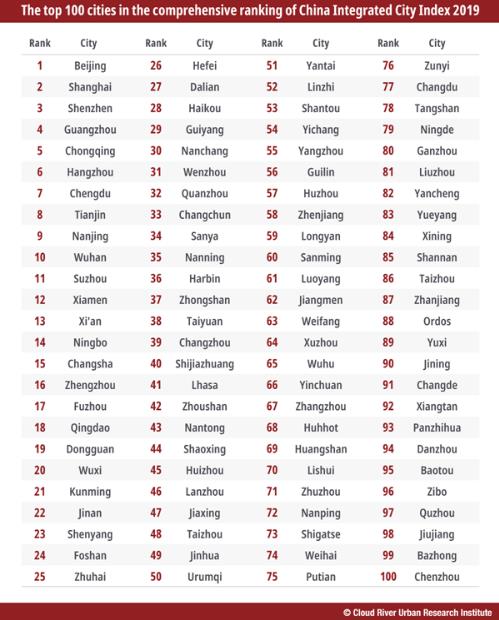China Integrated City Index 2019 ranks 297 Chinese cities

In the beginning of this year, Cloud River Urban Research Institute released the China Integrated City Index 2019, which ranks 297 Chinese cities at the prefecture level and above based on a comprehensive evaluation, as well as the top 100 cities in the categories of the environment, society and economy. Renowned scholars such as Zhao Qizheng, Yang Weimin, Zhou Qiren, Qiu Xiaohua, Du Ping, and Ming Xiaodong all have given a positive feedback on the Index in their articles, as well as their outlook on and expectations of the future development of Chinese cities.

Zhao Qizheng, dean of the School of Journalism at the Renmin University of China, and former minister of the State Council Information Office of China
I think the Index provides a new concept, a new discourse and a new framework for understanding and managing cities. I believe this book is a helpful reference book for Chinese mayors and their assistants. In the 1990s, when I was vice mayor of Shanghai, and the director and Party secretary of Pudong New Area, I was responsible for the development and construction of the new area. It was a pity that we didn't have such a good reference book at that time.
Many indicators are needed to describe a man's growth. A medical check-up entails dozens of indicators. Thirty years ago, we and even doctors had no idea of the health indicators that are common today. In such a case, how can we manage our body in a science-based way? Thirty years ago, Chinese people had an average life expectancy of less than 70 years. Now, the figure has approached 80, because health indicators have come into play.
In the same vein, we paid inadequate attention to what indicators can be used to describe the conditions of cities. We had outlined the plan of urban development by simply taking politics, economy, culture and other macro aspects into account. That was a very rough and crude approach. Now, if we need to plan and manage cities in an accurate way, we have to have a clear concept and research of cities, and delve into the analysis supported by a comprehensive index system. Therefore, Chinese cities can be built on the concept and the rational and comprehensive framework provided by the China Integrated City Index. A sophisticated data analysis and an in-depth research will come up with a recipe for "governance." That is the call of the times.







































